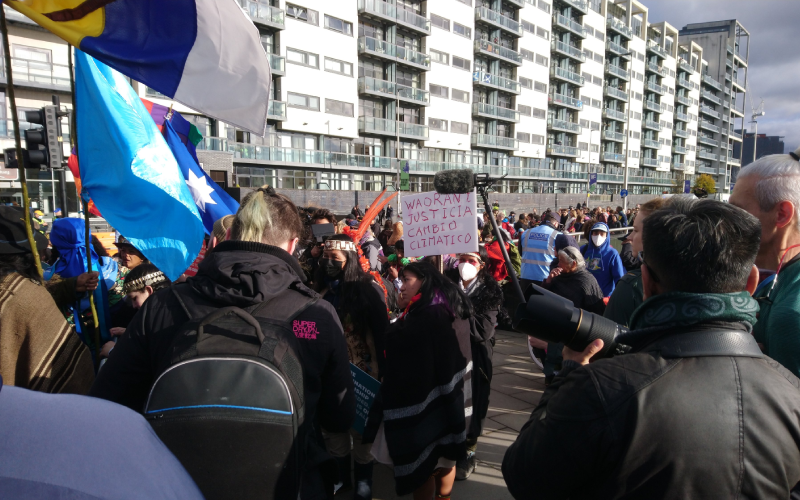You are here
- Home
- A Just COP?
A Just COP?

COP26 has been bringing together parties from across the world to accelerate action towards the goals of the Paris Agreement and the UN Framework Convention on Climate Change. The Open University has official observer status at COP26 and is learning from the conference to inform the university’s wider sustainability mission and inspire students and staff to take action. Here are some of the conference’s highlights, as told by our Open University observers.
COP26 Diary - 1 November: Dr Kate Symons, Lecturer in Global Development.
At this year’s COP 26 in Glasgow, I am participating as an official observer for the Open University. To try to make sense of this rather overwhelming, enormous and fragmented conference, I asked myself two questions at the beginning of the week: What would a just (decolonial, feminist, redistributive) COP look like? And how are different claims to justice being pressed at COP26?
Climate justice, and by extension, justice at COP conferences has been a pressing issue for many years. Climate justice is a broad approach which recognises the inherent political and ethical aspects of climate change, and advocates for solutions which foreground principles like a fair distribution of costs and benefits, fair representation in decision-making processes, and recognition of the rights of women, indigenous communities and underprivileged communities. It also focusses on the historic and political-economic structures that created the climate crisis such as colonialism and capitalism, and how efforts can be made to change fundamental systems.
The stated aims of COP26 certainly include important moves to promote climate justice, including securing ambitious emissions reduction targets to keep the goal of 1.5 degrees within reach, holding developed countries to their climate finance promises to fund adaptation to protect communities and natural habitats, and completing the Paris ‘rulebook’ on international climate governance and cop-operation.
However, there are several reasons to think COP26 is unjust. Highly vulnerable countries argue that commitments to emissions cuts are nowhere near fast or deep enough. There is expected to be a sticking point in negotiations on the amount of money deployed from the Global North to the Global South to fund emission reduction and adaptation, along with debates about how issues of compensation, loss, damage and responsibility are framed in official discourse. Climate activists say that processes like COP are highly exclusive, with indigenous and youth voices usually kept out of high-level discussions, while at the same time, celebrities including Leonardo DiCaprio and Jeff Bezos have access at the highest level. The spectacle of the founder of Amazon lecturing the world on his recent epiphany on climate change when the effects are being felt right now (primarily in the Global South), and climate scientists and activists have been sounding the alarm for years, goes right to the heart of climate justice.
This week, I am reflecting on different perspectives on climate justice at COP26, focussing on issues of power, access and neoliberal nature.
Image above: There are lots of activists outside COP26, but generally they are prevented from going beyond the security gates unless they have a pass. This raises questions about access, and the kinds of knowledge and perspectives that are not heard inside the key meeting rooms.
Related articles
- Accelerating Ambition and Impact: EAUC Conference 2024 30th July 2024
- Driving change: Imagining a different transport future 23rd July 2024
- Donating items to MK Food Bank 21st July 2024
- Butterflies as indicators of our impacts on nature - Climate Perspectives 9th July 2024
- Education for Sustainable Development Changemakers 8th July 2024